|
|
|
Sort Order |
|
|
|
Items / Page
|
|
|
|
|
|
|
| Srl | Item |
| 1 |
ID:
091978
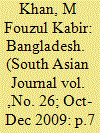

|
|
|
|
|
| Publication |
2009.
|
| Summary/Abstract |
The global recession could not have come at a less inopportune time for Bangladesh.The economy suffered shocks on both domestic and foreign fronts in FY08'. Domestically Bangladesh experienced two rounds of floods and was hit by the catastrophic major cyclone Sidr' which resulted in a huge loss of life and destruction of infrastructure, property and crops.
|
|
|
|
|
|
|
|
|
|
|
|
|
|
|
|
| 2 |
ID:
146538
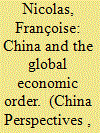

|
|
|
|
|
| Summary/Abstract |
Having long remained a passive presence within multilateral economic organisations, China recently changed its stance when the United States was faced with a major financial crisis. The present article re-examines China’s recent initiatives in matters of global economic governance from a long-term perspective. From this analysis it will emerge that in parallel with its economic takeoff, China has progressively shifted from a stance in favour of the global economic order – as defined and imposed following the Second World War – to a simple reformist approach that did not fundamentally challenge the established order, and then more recently to an increasingly overt revisionist approach, accompanied by the establishment of new institutions under Chinese influence. That being said, while China’s strategy is becoming more offensive, it remains fundamentally experimental in nature and the end goal remains unclear. Under the current conditions, it is far from certain that we are heading for a new global economic order where China rules supreme.
|
|
|
|
|
|
|
|
|
|
|
|
|
|
|
|
| 3 |
ID:
174733
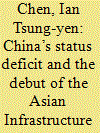

|
|
|
|
|
| Summary/Abstract |
This paper seeks to explore whether the Asian Infrastructure Investment Bank (AIIB) has become an instrument of power led by China to fulfill her geopolitical interests. After an investigation of the AIIB’s power structure, institutional design, and its 34 approved projects, this study finds that although the AIIB deviates to some extent from international standards while considering loan decisions, the bank itself does not appear to be a norm challenger so far. Instead, it has become more cooperative and inclusive, with a shifting focus towards mutually beneficial cooperation and reform of the international financial system. This paper argues that the AIIB's current configuration results from the decrease in China’s status deficit—the gap between China’s recognized international financial status and its own perception of its financial power. Quantitative and qualitative evidence shows that when the idea of the AIIB was first conceived, China’s status deficit was large, which meant that in a global power struggle the AIIB was more likely to be manipulated by a dissatisfied China. As the AIIB evolved, China’s international financial status gained positive recognition and the AIIB received wider acceptance; China’s status deficit shrank. As a result, the AIIB has become a reform-minded multilateral financial institution that has made concessions to establish rules and has sought collaboration with its counterparts.
|
|
|
|
|
|
|
|
|
|
|
|
|
|
|
|
| 4 |
ID:
091972
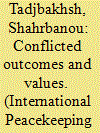

|
|
|
|
|
| Publication |
2009.
|
| Summary/Abstract |
The implementation of liberal peace in the context of both transition economies and post-conflict situations often involves policy advice from international financial institutions for rapid opening of the economic and political systems. Experience, however, shows that the immediate outcome is increased poverty and inequality, leading to high social and human costs. Efficiency-based inquiries on externally supported state building and peacebuilding projects often use a problem solving approach which seeks ways to improve performance without questioning the validity of the liberal peace model. Inquiries based on critical theory, however, question the underlying assumptions and the legitimacy of the project itself. Using evidence from Central Asia and Afghanistan, the article argues that legitimacy depends on both how much, in the eyes of local populations, liberal peace actually improves everyday life, and how much it is valued as a goal and adheres to internal norms and values. The main proposition is that values determine how the liberal peace model is understood, while outcomes impact on how the project is accepted. High expectations of protection and welfare during crises also mean that the state can play a key role as legitimizer.
|
|
|
|
|
|
|
|
|
|
|
|
|
|
|
|
| 5 |
ID:
100564
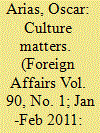

|
|
|
|
|
| Publication |
2011.
|
| Summary/Abstract |
Latin Americans must look in the mirror and confront the reality that many of our problems lie not in our stars but in ourselves. Only then will the region finally attain the development it has so long sought.
|
|
|
|
|
|
|
|
|
|
|
|
|
|
|
|
| 6 |
ID:
090136
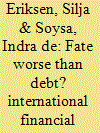

|
|
|
|
|
| Publication |
2009.
|
| Summary/Abstract |
Some report that human rights are likely to be violated when poor countries sign up to structural adjustment programmes (SAPs). These violations apparently occur because ordinary people revolt against the neo-liberal policies that SAPs push. This study examines the effect of the actual flow of finances from the World Bank and the IMF, holding constant all other bank-based financial flows, on government respect for human rights. The authors find that pay-in periods are beneficial for human rights, whereas loan dry-ups correlate with violations. Loan dry-ups are likely to occur because of noncompliance with SAPs rather than implementation, since the international financial institutions (IFIs) release loans in tranches to solve the time inconsistency problem. The overall level of indebtedness is robustly related to human rights abuses, but the higher the stock of debt owed to IFIs relative to total debt, the lower the human rights violations. Accumulating debt to IFIs, thus, seems to improve the level of human rights. Additionally, a higher government consumption to GDP ratio reduces human rights, a result that does not suggest that governments that are capable of commanding a higher share of the country's wealth are less likely to face threatening social dissent. Moreover, a proxy for neo-liberal policies, the index of economic freedom, correlates strongly with better human rights. These results do not square well with the view that neo-liberal policy reforms and the attendant austerity measures drive dangerous dissent.
|
|
|
|
|
|
|
|
|
|
|
|
|
|
|
|
| 7 |
ID:
100400
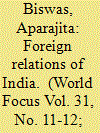

|
|
|
| 8 |
ID:
110103
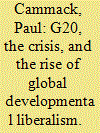

|
|
|
|
|
| Publication |
2012.
|
| Summary/Abstract |
The emergence of the G20 leaders' meeting during the recent global financial crisis as the 'premier forum for international economic cooperation' reflects a significant shift of hegemony over global governance towards the emerging economies but does not challenge the authority or objectives of the international financial institutions. On the contrary, successive G20 initiatives, culminating in the adoption of the Seoul Development Consensus for Shared Growth in November 2010, reveal both a further strengthening of the already close institutional relationship between the G20 and the Bretton Woods institutions and a strong shared commitment to a developmental form of global liberalism. This article charts the ascendancy of emerging economy perspectives through the lens of the G20, maps their ties to the imf and other international organisations, sets out the content of the new global developmental liberalism, and assesses the implications of emerging economy hegemony for the advanced and the emerging economies, respectively.
|
|
|
|
|
|
|
|
|
|
|
|
|
|
|
|
| 9 |
ID:
104787
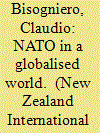

|
|
|
| 10 |
ID:
079677
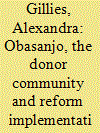

|
|
|
|
|
| Publication |
2007.
|
| Summary/Abstract |
President Obasanjo and the donor community pursued a mutually convenient close relationship that impacted the nature of reform implementation during his tenure in office. This article identifies the forces motivating these close relations and illustrates how they shaped Obasanjo's record of economic, governance and political reform. Several specific instances - debt relief, oil sector transparency and the third-term gambit - illustrate both the benefits and shortcomings of the donor community as a reform advocate in Nigeria
|
|
|
|
|
|
|
|
|
|
|
|
|
|
|
|
| 11 |
ID:
075379
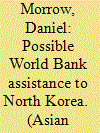

|
|
|
|
|
| Publication |
2006.
|
| Summary/Abstract |
Accepting the DPRK as a member of the World Bank would require the political support of most of the Bank's member governments, and this would become possible only if there is a successful resolution of the Six-Party Talks. The amount of financial assistance from the Bank would then depend on how seriously the DPRK pursues a transition to a more open and market-oriented economy, but in any case the Bank's financial assistance would be small compared to the DPRK's needs and to the potential assistance from bilateral sources. Nevertheless, the World Bank's policy advice and its potential role in coordinating and catalyzing other assistance could be important for North Korean economic development. The prospects for quickly launching a constructive relationship between the DPRK and the World Bank following a successful conclusion of the Six-Party Talks would be enhanced by advanced preparation on both sides. In particular, the DPRK should begin to articulate its own strategy for economic transition.
|
|
|
|
|
|
|
|
|
|
|
|
|
|
|
|
| 12 |
ID:
155869
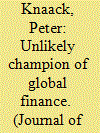

|
|
|
|
|
| Summary/Abstract |
As a G20 member, China has been engaged in financial reform since the end of the global financial crisis. A core piece of this reform is Basel III, the new prudential standard issued by the Basel Committee. Rather than being merely compliant, China’s banking regulation is stricter than the global standard and being implemented ahead of the international timetable. Why is China voluntarily subjecting itself to tougher regulatory standards than the rest of the world? This article shows that low adjustment costs, factional politics, and, above all, an unusual alignment of domestic interests in the quest for international reputation are driving this phenomenon. The troubled institutional history of China’s financial system motivates all relevant stakeholders to seek external validation in order to address a credibility gap abroad, albeit for different reasons. The article examines the power of reputation as a driver of regulatory positioning in the context of China’s integration into international financial institutions.
|
|
|
|
|
|
|
|
|
|
|
|
|
|
|
|
|
|
|
|
|